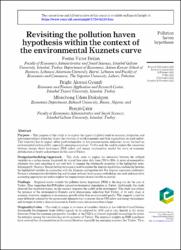| dc.contributor.author | Bekun, Festus Victor | |
| dc.contributor.author | Gyamfi, Bright Akwasi | |
| dc.contributor.author | Etokakpan, Mfonobong Udom | |
| dc.contributor.author | Çakır Gündoğdu, Burçin | |
| dc.date.accessioned | 2023-04-06T11:26:02Z | |
| dc.date.available | 2023-04-06T11:26:02Z | |
| dc.date.issued | 2023 | en_US |
| dc.identifier.issn | 1750-6220 | |
| dc.identifier.issn | 1750-6239 | |
| dc.identifier.uri | https://hdl.handle.net/11363/4376 | |
| dc.description.abstract | Purpose – This purpose of this study is to explore the impact of global trend of economic integration and
interconnectedness which has drawn the attention of world economies and their implications on trade inflow.
This trajectory has its impact, either positive/negative, on key macroeconomic indicators, to say the least on
environmental sustainability, especially emerging economies. To this end, the need to explore the connection
between foreign direct investment (FDI) inflow and energy consumption amidst the wave of economic
globalisation is timely and pertinent for the case of Turkey.
Design/methodology/approach – This study seeks to explore the interaction between the outlined
variables in a carbon-income framework for annual time series data from 1970 to 2016. A series of econometrics
strategies was used consisting of unit root tests to examine the stationarity properties of the highlighted series.
Subsequently, Pesaran’s Bounds testing technique is used to explore the long-run equilibrium relationship between
the highlighted variables in conjunction with the Johansen cointegration test. For long-run regression coefficients,
Pesaran’s autoregressive distributed lag and dynamic ordinary least squares methodology are used, and innovative
accounting approaches are used to explore the responsiveness of each variable on another.
Findings – Empirical results validate the pollution haven hypothesis (PHH) in the long run for the case of
Turkey. Thus suggesting that FDI inflow induced environmental degradation in Turkey. Additionally, this study
observed that renewable energy, on the contrary, improves the quality of the environment. This study also affirms
the presence of the environmental Kuznets curve phenomenon, indicating that Turkey, at its early stage of
economic trajectory, emphasis is on economic growth rather than environmental quality. This suggests a need for
more deliberate action(s) by the government administrators to pursue cleaner FDI inflow and energy technologies
and strategies to foster a clean environment in Turkey and a cleaner ecosystem at large.
Originality/value – This study is unique in its choice of variables which is in line with the United Nations
Sustainable Development Goals (SDGs) agenda to be achieved by 2030 and is very limited in the extant
literature. From the economic perspective, the effect of the PHH is of interest especially to ascertain the extent
the interplay among the variables has on the economy of Turkey. The empirical insights on PHH hypothesis
have received less documentation in the extant literature especially for emerging economy like Turkey. Thus, this study seeks to revisit this theme for Turkey with aim to presents environmentally sustainable strategies
without compromise for economic growth. Thus, this study seeks to revisit this theme. | en_US |
| dc.language.iso | eng | en_US |
| dc.publisher | EMERALD GROUP PUBLISHING LTD, HOWARD HOUSE, WAGON LANE, BINGLEY BD16 1WA, W YORKSHIRE, ENGLAND | en_US |
| dc.relation.isversionof | 10.1108/IJESM-12-2020-0013 | en_US |
| dc.rights | info:eu-repo/semantics/openAccess | en_US |
| dc.rights | Attribution-NonCommercial-NoDerivs 3.0 United States | * |
| dc.rights.uri | http://creativecommons.org/licenses/by-nc-nd/3.0/us/ | * |
| dc.subject | Environmental sustainability | en_US |
| dc.subject | Pollution haven hypothesis | en_US |
| dc.subject | Carbon-reduction strategies | en_US |
| dc.subject | Renewable energy Turkey | en_US |
| dc.title | Revisiting the pollution haven hypothesis within the context of the environmental Kuznets curve | en_US |
| dc.type | article | en_US |
| dc.relation.ispartof | International Journal of Energy Sector Management | en_US |
| dc.department | İktisadi İdari ve Sosyal Bilimler Fakültesi | en_US |
| dc.identifier.startpage | 1 | en_US |
| dc.identifier.endpage | 22 | en_US |
| dc.relation.publicationcategory | Makale - Uluslararası Hakemli Dergi - Kurum Öğretim Elemanı | en_US |



















